After receiving dental implants, you’ll need to watch what you eat. Transitioning to a soft diet may seem like a hard thing to do but it’s what’s best for your mouth. For the first 10 to 14 days after your dental implants are put in, you’ll need to be careful about your food intake.
Immediately following your implantation surgery, especially if you have been placed under sedation, you should replenish any fluids that have been lost. Drink cool liquids and avoid using a straw. The sucking motion can lead to more bleeding. Stay away from anything carbonated and food and drinks that are extremely hot. However, that doesn’t mean you have to stick with water for two weeks.
Foods To Eat:
- Dairy products are great when you’re adhering to a soft food diet. They’re full of calcium and protein, so you’ll be less hungry when you incorporate soft cheese into your diet. Yogurt and milk can be blended into smoothies that are easy to swallow. If you are lactose intolerant opt for milk alternatives like almond, soy or coconut. Just watch that you are choosing the original, unsweetened options to keep your sugar consumption low.
- If dairy is not your thing, you can get protein elsewhere from nut butter, eggs, soft fish, oatmeal, oat bran and cream of wheat.
- Do not forget to eat your fruits and vegetables. You do not have to puree everything but make sure that whatever fruits and veggies you do eat are soft enough that they require little to no chewing.
- Other staples of a soft food diet are baked or mashed potatoes, beans, rice, soft bread, applesauce, stew, and soup.
Foods To Avoid:
- Any food that needs to be thoroughly chewed like steak needs to be avoided while you’re on your soft food diet.
- Food that could cause pain to your gums, like chips, popcorn, nuts, and shells should not be consumed while you recover from your implant surgery.
- Toast is a big no-no in the two weeks that follow your dental implant surgery. All bread consumed must be soft so as to not hurt your gums and the roof of your mouth.
- Watch out for baby food. You don’t have to avoid it completely but the sugar and fat content of store-bought baby food is often very high.
Foods To Treat Yourself
If you’re looking for something sweet after a few days of maintaining your soft food diet, you can try pudding, Jell-O, ice cream, very soft chocolate or a soft dessert like a pound cake. Do not overdo it as your body is still healing.
Another important part of the soft food diet is to eat. This may sound silly but skipping meals while your body is healing will only impede the process. Your body needs food to keep going; so make sure you’re eating enough while you recover.
